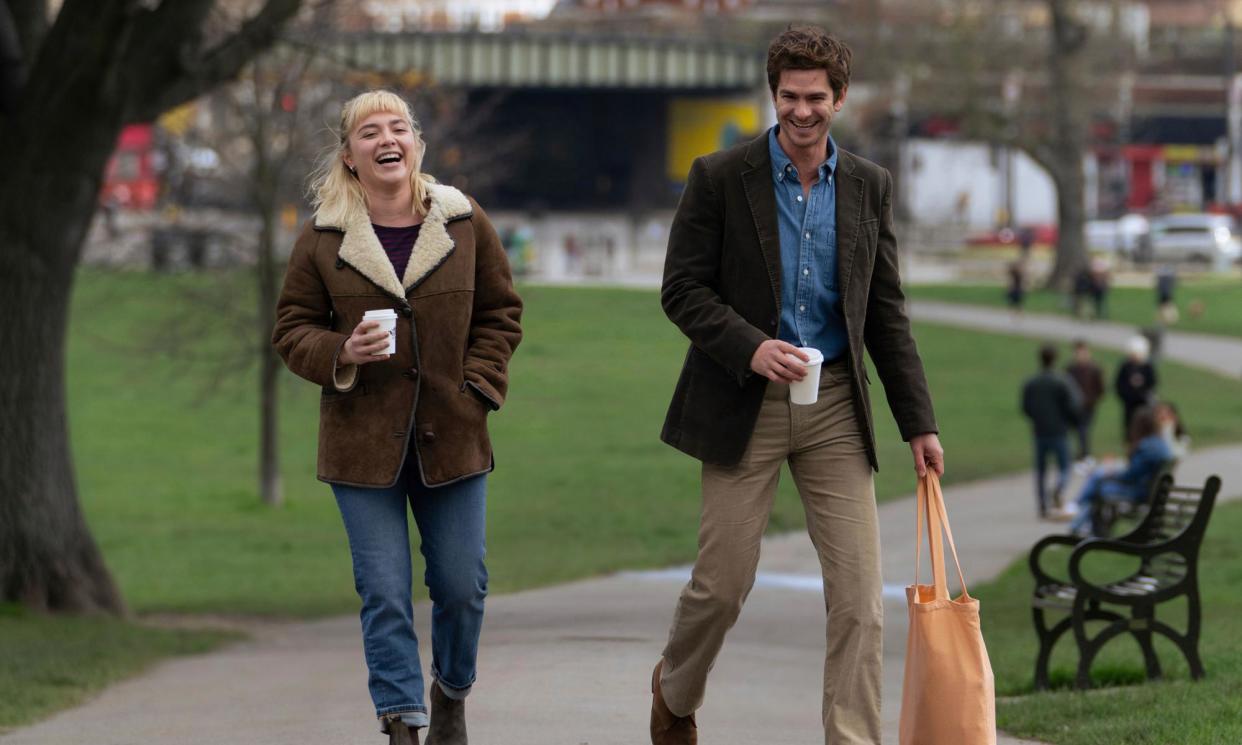We Live in Time review – Andrew Garfield and Florence Pugh charm in heartfelt weepie

There was a warm late summer surprise to be had with last month’s surprisingly thoughtful and tender adaptation of Colleen Hoover’s supermarket bestseller It Ends With Us. It was a proud and powerful resurrection of the sort of glossy melodrama that had grown terribly unfashionable, mostly demoted to the small screen and almost always the subject of easy derision. Its shock commercial success (nearing $300m globally) will undoubtedly lead to more but already, premiering weeks later at the Toronto film festival, we have another heart-over-head weepie in We Live in Time, a smart and sensitive crowd-pleaser that should prove similarly irresistible to an impassioned yet underserved audience.
Related: Hard Truths review – a Mike Leigh classic of day-to-day disillusionment and courage
There’s also a touch of the golden era Working Title romcom here, before that formula became harder to love and easier to parody. It’s a tale of attractive, sweary Londoners flirting and falling in love but here they’re also grappling with some knottier, less cosy issues. It’s no spoiler, given both the trailer and the film’s time-jumping structure flitting back and forth, that it’s also about late-stage cancer, a development that has become something of a red flag given the rote nature of many disease-of-the-week dramas. But Irish stage and screen director John Crowley, who found his biggest success with 2015’s Brooklyn, has found a way to breathe life into a film about death, not aiming for wheel reinvention exactly but confidently relying on the power of big, honest emotions and two A-game stars who can easily sell them.
It’s not as though We Live in Time is entirely reliant on the significant star power of Florence Pugh and Andrew Garfield (the film has pleasures beyond their top-tier performances) but their chemistry is just so electric that it would be hard to imagine how any of it could work quite so well without them. Both actors have already convinced us of their charm but we’ve never really seen them show it in territory such as this, most of their films requiring them to focus on the murkier side of life. Pugh especially has mostly shown her sunnier side off-screen, in interviews or on Instagram, but she’s a radiant romantic lead here, playing a woman reluctant to define herself as just mum or wife. She’s Almut, a chef who, weeks before opening her new restaurant, has an unlikely meet-cute with Garfield’s Tobias, whom she hits with her car on the night he’s signing his divorce papers.
The timeline leaps between early, sex-on-the-floor courtship to a complicated pregnancy to Almut’s diagnosis, the highs of long, easy weekends contrasted with the lows of short, difficult days of impossible decision-making. The script, from playwright Nick Payne, manages this without confusion and also without making it feel like a desperate gimmick, something to gussy up a version of a story we’ve been told before. It’s a structure that works for the most part, showing us the pain of figuring out how to spend precious time, although I’d argue that the main downside is that by smattering the more emotive third act scenes throughout the film, we’re denied the escalation that would have otherwise led to the cathartic cry we expect at the end which feels a little anti-climactic.
While a lot of the film is simply an engaging, elevated take on a familiar tale, Payne’s script does find something more interesting and less obvious to say about a desire to be remembered as a respected professional before one’s death rather than just a loved family member. It’s especially effective here from the perspective of a woman, as Almut spends time secretly competing for a major cooking competition, desperate to prove herself as exceptional and Pugh, as warm as she is here, has the believable severity and seriousness of a chef (her real life social media presence shows her to be a keen foodie).
It’s such a joy to watch two such assured and natural performers allowed the room to exercise both movie star and actor muscles as well as showcase their ease with both comedy and drama. The film is also daringly yet successfully insular, barely allowing other characters the chance to speak for that long, focused entirely on the two and the world they have created. Their softer, funnier and sexier scenes are more effective than most romantic comedies we’ve seen for a long while but then their harder, weightier conflicts are just as effective. Pugh is particularly, at times devastatingly, great here with the showier of the roles, proving once again that she’s arguably the most consistently astonishing young actor working today. She’s able to add such intricacy and hair-raising emotion to scenes we’ve seen a thousand times before, and in what’s looking like a thin year for the best actress race, it would seem unfair not to include her, despite the film’s old-fashioned trappings making it feel perhaps less Oscar-friendly at this current moment.
I found its throwback nature to be immensely charming, a big, full-throated romantic drama that knows exactly how to make us swoon as well as make us sad. I hope there’s time for more like it.
We Live in Time is out in the US on 11 October and in the UK on 1 January 2025

 Yahoo Movies
Yahoo Movies 
